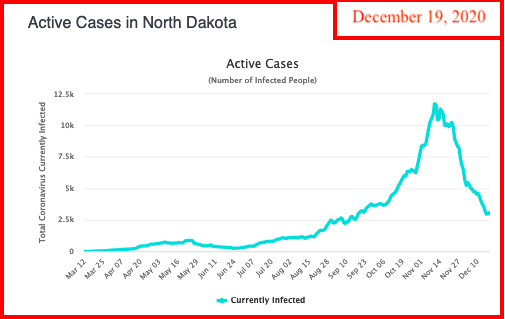First things first: if you have clear skies during the early evenings for the next few nights, be sure to step outside, look to the southwest, with an outstretched hand, about two hand-widths above the horizon, look for a bright "star." It will be Jupiter. It will be so bright it will almost "blot" out Saturn which will be at the 11:00 o'clock position to Jupiter. On December 21st, the two planets will "be on top of each other" -- you will see a single "star." By 9:00 p.m. (possibly earlier, depending upon where you live), the "star" will be below the horizon. We had trouble making out Saturn two nights ago due to the brightness of Jupiter. We couldn't see anything last night due to clouds.
ZeroHedge: it will be interesting to see if ZeroHedge links / reports this story after all the stories that site posted regarding Sweden, stories that changed the discussion. Swedish officials admit they "blew it." Even the King of Sweden says the country's Covid-10 strategy has failed. Link here.
Holy mackerel! For the first time ever in the pandemic, on a per capita basis, Sweden just surpassed the United States in number of cases. Link here.
Road to New England: man-made natural gas disaster for New England. Link here.
Boston is importing liquefied natural gas from Russia, while the U.S. is
#1 in natural gas production in the world with arguably the lowest
price natural gas in the world. New York Governor Andrew Cuomo has
banned hydraulic fracking and new interstate natural gas pipelines in
his state, forcing the Northeast (NE) states to look elsewhere for
natural gas…across the Atlantic Ocean in the Russian Arctic.
Grids:
ISO New England.
ISONY. On a Saturday during the pandemic, following a huge storm, winter storm Gail, almost everything shut down.
- ISO-NE:
- price surge to $105; currently running at $70
- fuel mix
- natural gas maxed out
- renewables at one of the lowest levels I've seen: 6%
- hydro: 6%
- oil: 5%
- coal: 3%; maxed out
- ISO-NY:
- Long Island: $78
- fuel mix:
- dual fuel: 23%
- natural gas: 23%
- nuclear: 29%
- hydro: 22%
- wind: 0.6%
Chinese flu watch, Johns Hopkins data:
- "brown" map starting to get a bit darker (bad news for economy)
- top five: California moves to #2
- Tennessee (#1), Arizona (#3), Rhode Island (#4); and Indiana (#5)
- Herd immunity:
- North Dakota at 11.8%; curve;
- South Dakota at 10.6%
- US average: 5.4%
- Texas: 5.4%
- California: 4.6%
- So, what happened?
**************************************
The Book Page
On Tax Assessments
Interesting essay, "Why History Goes in Circles" by Eric Ormsby
in this weekend's edition of The Wall Street Journal.
It begins:
Ibn Khaldun pops up in the most unexpected places.
This late medieval Tunisian-born thinker (1332-1406) has been celebrated
by historians, economists, sociologists and ethnographers, not to
mention scholars of Islamic thought, often rather vaguely and without
any precise understanding of the nature of his ideas.
He has been called
“the father of sociology” or the first “philosopher of history,” among
other honorifics. In 1935 the popular English historian
Arnold Toynbee,
the author of “A Study of History” in 12 volumes, waxed
rhapsodical over
Ibn Khaldun’s
accomplishments, claiming that his “Muqaddimah” (“Introduction”
in Arabic) was “undoubtedly the greatest work of its kind that has ever
been created by any mind in any time or place.” It doesn’t detract from
Ibn Khaldun’s genuine originality to note that this claim is the
sheerest hyperbole. Yet it had the happy effect of putting Ibn Khaldun
back on the intellectual map, and it contains an element of truth: His
speculations on history were unprecedented, his theories both novel and
persuasive.
As
Robert Irwin
notes in his excellent “Ibn Khaldun: An Intellectual Biography” (Princeton, 243 pages, $29.95),
his subject’s influence has also been pervasive, if often subterranean.
To take one surprising example: On Oct. 1, 1981, President
Ronald Reagan
alluded to him in a press conference when he invoked “a principle
that goes back at least, I know, as far as the 14th century, when a
Muslim philosopher named Ibn Khaldun said, ‘In the beginning of the
dynasty, great tax revenues were gained from small assessments. At the
end of the dynasty, small tax revenues were gained from large
assessments.”
(The president added—O forlorn hope!—“And we’re trying to
get down to the small assessments and the great revenues.”) As Mr. Irwin
shows, Ibn Khaldun’s cyclical notion of history also underlies classic
works of science fiction, such as
Isaac Asimov’s
“Foundation” trilogy and
Frank Herbert’s
“Dune.” No other Muslim author, let alone one writing in
high-flown classical Arabic, has had comparable influence on thinkers
and scholars in both the Islamic world and the West.
Prince Salman is not mentioned in the essay -- you know, the one that has imposed huge tax assessments on his kingdom.



